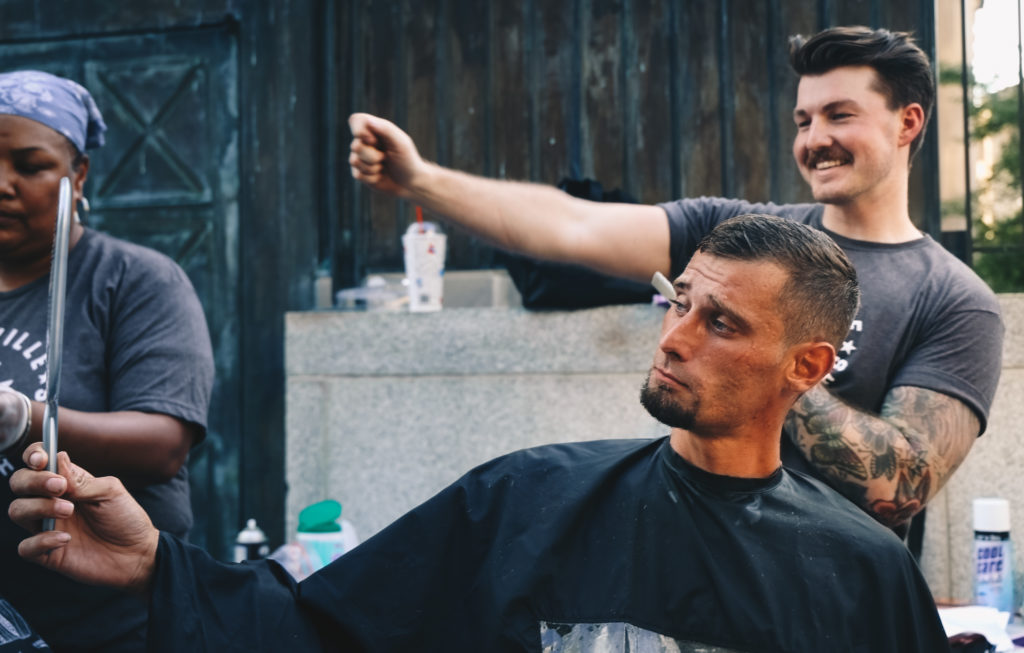
Getting a professional haircut when you’re homeless is not a priority — or usually even a possibility. But a group of local hair stylists is working to give everyone a chance to look and feel good.
The Nashville Street Barbers are the latest to join a weekly downtown gathering where the city’s indigent are offered a shower, a meal — and a sense of community. Every Monday night, War Memorial Plaza buzzes with activity. Friends high five and hug one another, kids run around, volunteers joke with familiar faces.
And in one corner, a row of people sit in salon chairs. They chat with stylists in gray t-shirts sporting the Street Barbers logo. These volunteers snip, shave and shear from 6-8 pm, though the waiting list may be 30 long before they even get there.
 Julieta Martinelli WPLN
Julieta Martinelli WPLNNashville Street Barbers founder Caroline Lindner and formerly homeless veteran Pete O’Connor, who says free haircuts are especially great for those preparing for job interviews.
Another volunteer with a clipboard calls out names when a chair opens up. Like that of Shannon Evans, a 31-year-old veteran who is struggling to get off the streets. He says he recently suffered a breakdown, from the solitude of having no family and nowhere to go. He says that seeing people donating their time — and talent — like the street barbers, is “priceless.” And what he gets from them goes beyond a simple haircut.
“It makes people look at me different,” says Evans, “like they don’t think I’m homeless, so long as I don’t dress nasty. It makes people see me as a human and more than that, it’s like somebody cares.”
Nashville Street Barbers was started a little over a year ago by Caroline Lindner. The full-time stylist had been organizing haircuts for nonprofits for five years. She was looking for a new project when she read about a group offering free showers downtown in mobile trucks, and asked to join them.
 Julieta Martinelli WPLN
Julieta Martinelli WPLNCynthia Pritchard slept in a hammock in Madison after a stroke depleted her savings. Now she’s getting back on her feet and mentoring others in need.
 Lindner came alone at first. And says she was terrified, that she might not be well received.
Lindner came alone at first. And says she was terrified, that she might not be well received.
“I think people know when you’re scared and I think it takes a lot to trust someone with your hair too,” says Lindner. “So it took quite a while to gain trust and to feel comfortable and to just show up and attack it.”
Now there might be up to dozen barbers on a Monday night, and they get repeat customers. The stylists don’t have the tools to wash hair — they mostly do dry cuts. But they do use outlets built into the plaza, to plug in hair dryers and electric shavers.
Some clients just ask for a trim. Others, like Tasha Hayford, are more specific. She told her barber to give her a “short pixie bob, short in the back and long in the front” because she was tired of having long hair in the heat.
Lindner says this has been her most successful project to date. She says she never has to nudge volunteers to show up because “this whole thing is about just being happy and helping people.”
Sometimes up to 80 people a night come for cuts, and not all of them live on the streets. Some, like Pete O’Connor, come because even a $20 haircut is expensive. The formerly homeless veteran heard about the group recently and has already come twice, because his hair grows fast.
 O’Connor thinks this kind of a situation is great for people looking for a job, who are “in a position where they need to make themselves look neat, and doing what they can to take care of themselves.”
O’Connor thinks this kind of a situation is great for people looking for a job, who are “in a position where they need to make themselves look neat, and doing what they can to take care of themselves.”
Another regular customer is Cynthia Pritchard. A former traveling carnival worker, Pritchard had a stroke while in Chicago a couple of years ago. That depleted almost all of her savings in just months, so she decided to come to Nashville because, she says, “I knew I could get help here that I needed.”
Lately, Pritchard had been sleeping in a hammock in Madison with her cat. But she is getting back on feet. She recently went through a worklife program and was hired by UPS, pending a background check. As her barber dusts some hair off her nose, Pritchard says a lot of homeless people are on the streets because they’re struggling financially, and many others are just one paycheck away from ending up homeless.
 So Pritchard would like to see people with all types of skills to join the stylists: “Get down here and learn how to help and be a mentor for somebody who could use you.”
So Pritchard would like to see people with all types of skills to join the stylists: “Get down here and learn how to help and be a mentor for somebody who could use you.”
Now that she’s getting back on her feet, Pritchard says she herself intends to start mentoring women who are trying to get off drugs.

